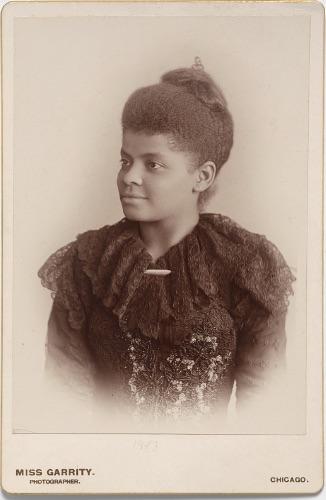
Protesters along a street in Chicago. See more photographs, letters, records and scrapbooks from suffragists in the new exhibition Shall Not Be Denied: Women Fight for the Vote at the Library of Congress.
On June 4, 1919, the U.S. Congress passed a federal women's suffrage amendment and sent it to the states for ratification. It was a thrilling moment for the movement to win the women's vote and a major milestone after years of smart campaigning.
Suffragists deployed a range of creative communications tools to advocate for the cause: They staged costumed tableaux at protest marches, organized church committees, held up handmade signs in front of the White House, published their own newspapers and even walked 230 miles from New York City to Washington, D.C.

Before the March 3, 1913, women’s suffrage march in Washington, DC, suffragists debated whether African American participants should walk in a segregated section. Suffrage leader Ida B. Wells joined the parade and marched alongside the all-white Illinois delegation. Sallie E. Garrity (ca. 1862–1907) Albumen silver print, ca. 1893. National Portrait Gallery, Smithsonian Institution. Learn more in the “Votes for Women” Google Arts & Culture online exhibition

In 1917, suffragists were arrested for picketing the White House. This suffragist is being escorted into a car to be taken to the police station. U.S. National Archives.

Protesters along a street in Chicago. See more photographs, letters, records and scrapbooks from suffragists in the new exhibition Shall Not Be Denied: Women Fight for the Vote at the Library of Congress.
If social media had been available, these women would likely have leveraged it to organize and draw attention to the cause of women's suffrage. (A recent tweet from the National Archives tells us that "suffrage" comes from the Latin word "suffragium," meaning the privilege to vote.)
But while women couldn't tweet or post on Instagram at the turn of the 20th century, we can! As we commemorate the 100th anniversary of the 19th Amendment, we invite you to learn about this history through social media. Here are several ways you can connect with this history on social media:
June 20: March along with us on a social media tour
Telling the story of the largest reform movement in American history is a big job for any single exhibition, so we are bringing three exhibitions to you! Social media guides from the Smithsonian, National Archives and Library of Congress will visit our three exhibitions and share the highlights with you on Twitter and Instagram. Follow the hashtag #HerVote100 to meet the experts who worked on the exhibition and learn about the women who persisted in the fight for the vote. Don't hesitate to ask questions. Stops on our social tour include:
Shall Not Be Denied: Women Fight for the Vote at the Library of Congress
Rightfully Hers: American Women and the Vote at the National Archives
Votes for Women: A Portrait of Persistence at the Smithsonian's National Portrait Gallery
Throughout June: Get your weekly dose of women's history
Celebrate the passage of the 19th Amendment with 19 weeks of amazing women in history with the @USNatArchives on Instagram. Starting on June 5, the National Archives will post a theme each week featuring a woman in history. Share the story of women who inspire you by using the hashtag #19forthe19th!
The Library of Congress also is exploring the stories of individual suffragists and their contributions to changing America each week through June. Follow along with #ShallNotBeDenied on Twitter and Instagram.
Hashtags to explore all month on Instagram and Twitter include #RightfullyHers and #19that100.
Here's where you can find us on social media:
Library of Congress
- Twitter: @LibraryCongress
- Instagram: @LibraryCongress
National Archives
- Twitter: @USNatArchives
- Instagram: @USNatArchives
Presidential Libraries on Twitter: @OurPresidents
National Archives Foundation
- Twitter: @ArchivesFdn
- Instagram: @ArchivesFdn_
Smithsonian
- Twitter: @Smithsonian
- Instagram: @Smithsonian
National Portrait Gallery
- Twitter: @SmithsonianNPG
- Instagram: @SmithsonianNPG
National Museum of African American History and Culture
National Museum of American History
- Twitter: @amhistorymuseum
- Instagram: @amhistorymuseum
June will be a big month for women's history, but it's a theme we'll explore throughout the year. Other recommended hashtags to browse: #BecauseOfHerStory, #HiddenHerstory, and #Suffrage100DC
This story is cross-posted on the websites of the Library of Congress, National Archives, and Smithsonian's American Women's History Initiative.